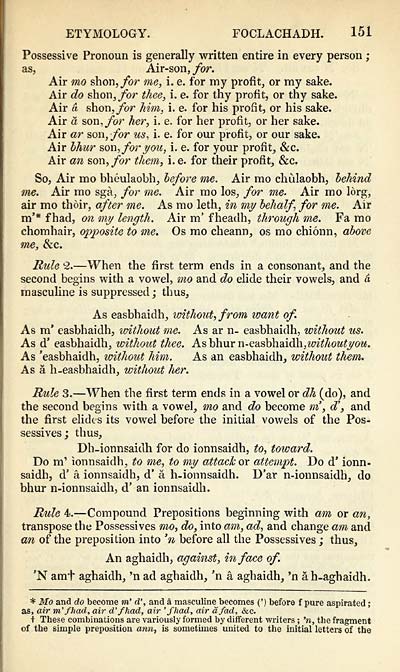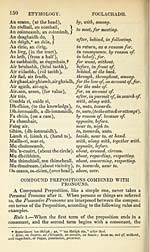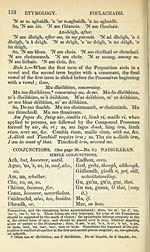Books and other items printed in Gaelic from 1841 to 1870 > Stéidhean a' Ghràmair Ghaëlig
(179) Page 151
Download files
Complete book:
Individual page:
Thumbnail gallery: Grid view | List view

ETYMOLOGY.
FOCLACHADH. 151
Possessive Pronoun is generally written entire in every person ;
as, Air-son, for.
Air mo shon, /br me, i. e. for my profìt, or my sake.
Air do shon, for thee, i. e. for thy profit, or thy sake.
Air à shon,/or him, i. e. for his profit, or his sake.
Air à son, for her, i. e. for her profit, or her sake.
Air ar son, for us, i. e. for our profit, or our sake.
Air bhur son,foryou, i. e. for your profìt, &c.
Air an son, for them, i. e. for their profit, &c.
So, Air mo bhèulaobh, before me. Air mo chùlaobh, behind
me. Air mo sgà, for me. Air mo los, for me. Air mo lòrg,
air mo thòir, after me. As mo leth, in my behalf for me. Air
m'* f had, on my length. Air m' fheadh, ihrough me. Fa mo
chomhair, opposite to me. Os mo cheann, os mo chiònn, above
me, &c.
Rule 2. — When the first term ends in a consonant, and the
second begins with a vowel, mo and do elide their vowels, and à
masculine is suppressed ; thus,
As easbhaidh, without,from want of.
As m' easbhaidh, without me. As ar n- easbhaidh, without us.
As d' easbhaidh, without thee. As bhur n-easbhaLÌdh, withoutyou.
As 'easbhaidh, without him. As an easbhaidh, without them.
As à h-easbhaidh, without lier.
Rule 3. — When the fìrst term ends in a vowel or dh (do), and
the second begins with a vowel, mo and do become m', d', and
the fìrst elides its vowel before the initial vowels of the Pos-
sessives ; thus,
Dh-ionnsaidh for do ionnsaidh, to, toward.
Do m' ìonnsaidh, to me, to my attaclcox attempt. Do d' ionn-
saidh, d' à ionnsaidh, d' à h-ionnsaidh. D'ar n-ionnsaidh, do
bhur n-ionnsaidh, d' an ionnsaidh.
Rule 4. — Compound Prepositions beginning with am or an,
transpose the Possessives mo, do, into am, ad, and change am and
an of the preposition into 'n before all the Possessives ; thus,
An aghaidh, against, in face of.
'N amt aghaidh, 'n ad aghaidh, 'n à aghaidh, 'n àh-aghaidh.
* Mo and do become m' d', and à masculine becomes (') before f pure aspirated ;
as, air m' fhad, air d'/kad, air 'fhad, air àfad, &c.
t These combinations are variously formed by different writers ; 'n, the fragment
of the simple preposition ann, is sometimes united to the initial letters of the
FOCLACHADH. 151
Possessive Pronoun is generally written entire in every person ;
as, Air-son, for.
Air mo shon, /br me, i. e. for my profìt, or my sake.
Air do shon, for thee, i. e. for thy profit, or thy sake.
Air à shon,/or him, i. e. for his profit, or his sake.
Air à son, for her, i. e. for her profit, or her sake.
Air ar son, for us, i. e. for our profit, or our sake.
Air bhur son,foryou, i. e. for your profìt, &c.
Air an son, for them, i. e. for their profit, &c.
So, Air mo bhèulaobh, before me. Air mo chùlaobh, behind
me. Air mo sgà, for me. Air mo los, for me. Air mo lòrg,
air mo thòir, after me. As mo leth, in my behalf for me. Air
m'* f had, on my length. Air m' fheadh, ihrough me. Fa mo
chomhair, opposite to me. Os mo cheann, os mo chiònn, above
me, &c.
Rule 2. — When the first term ends in a consonant, and the
second begins with a vowel, mo and do elide their vowels, and à
masculine is suppressed ; thus,
As easbhaidh, without,from want of.
As m' easbhaidh, without me. As ar n- easbhaidh, without us.
As d' easbhaidh, without thee. As bhur n-easbhaLÌdh, withoutyou.
As 'easbhaidh, without him. As an easbhaidh, without them.
As à h-easbhaidh, without lier.
Rule 3. — When the fìrst term ends in a vowel or dh (do), and
the second begins with a vowel, mo and do become m', d', and
the fìrst elides its vowel before the initial vowels of the Pos-
sessives ; thus,
Dh-ionnsaidh for do ionnsaidh, to, toward.
Do m' ìonnsaidh, to me, to my attaclcox attempt. Do d' ionn-
saidh, d' à ionnsaidh, d' à h-ionnsaidh. D'ar n-ionnsaidh, do
bhur n-ionnsaidh, d' an ionnsaidh.
Rule 4. — Compound Prepositions beginning with am or an,
transpose the Possessives mo, do, into am, ad, and change am and
an of the preposition into 'n before all the Possessives ; thus,
An aghaidh, against, in face of.
'N amt aghaidh, 'n ad aghaidh, 'n à aghaidh, 'n àh-aghaidh.
* Mo and do become m' d', and à masculine becomes (') before f pure aspirated ;
as, air m' fhad, air d'/kad, air 'fhad, air àfad, &c.
t These combinations are variously formed by different writers ; 'n, the fragment
of the simple preposition ann, is sometimes united to the initial letters of the
Set display mode to:
![]() Universal Viewer |
Universal Viewer | ![]() Mirador |
Large image | Transcription
Mirador |
Large image | Transcription
Images and transcriptions on this page, including medium image downloads, may be used under the Creative Commons Attribution 4.0 International Licence unless otherwise stated. ![]()
| Rare items in Gaelic > Books and other items printed in Gaelic from 1841 to 1870 > Stéidhean a' Ghràmair Ghaëlig > (179) Page 151 |
|---|
| Permanent URL | https://digital.nls.uk/101713747 |
|---|
| Description | Out-of-copyright books printed in Gaelic between 1631 and 1900. Also some pamphlets and chapbooks. Includes poetry and songs, religious books such as catechisms and hymns, and different editions of the Bible and the Psalms. Also includes the second book ever published in Gaelic in 1631. |
|---|

